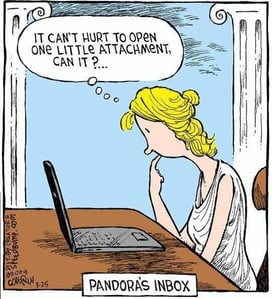You might have seen in the Metro that you have "two weeks to save your computers" and wondered what you could do.
Here are a few tips which should help keep you protected from computer viruses.
- Make sure you have Antivirus installed and it is up to date. We highly recommend AVG instead of Norton or McAfee. If your Antivirus software has expired, take this opportunity to renew it as you may not be receiving any protection from it.
- Free Antivirus packages tend to offer scanning of files that are already on your computer. The "paid for" versions may offer extra features like real-time scanning of files or even internet links.
- Do not be tempted to run more than one Antivirus package. It doesn't provide double the protection, it just makes your computer run really slowly.
- Ensure all Windows updates are installed, as well as third party updates like Java, Adobe Flash and Adobe Reader are installed.
- Keep backups of your files – Documents, Pictures, Music & Videos etc. If you have never made a backup before, this is a great time to start.
- Never open any emails from people you don't know or even at times when you are not expecting them. So if your colleague from work emails you, and there's an attachment, but nothing in the email about any attachment, do not open it. Email them back and ask them if they meant to send an attachment.
- Don't click on links in emails. Instead, copy the link to your browser and paste the link in.
- Your bank will never email you and ask you to confirm your password. Never click on a link that comes from your bank and enter your log-in details.
- If your computer has new icons that have appeared on the desktop, or your Internet home page changes or new tool-bars appear on your web browser then these are signs that you might be infected.
- If you suddenly have a program pop up saying that you have lots of issues with your computer – it is more likely that your computer has a type of virus called "scareware" (which scares you into thinking you have a problem with your computer and try's to sell you a solution which doesn't actually repair your computer.

The threat
Cyber-criminals are constantly devising new types of computer viruses, called "malware" to commit financial theft, fraud, identity theft and other crimes against ordinary people. The proceeds of their crime are also used to fund further organised crime. This latest threat is particularly dangerous because it uses two different types of malware to infect your computer in order to commit these crimes:
- A virus known as Gameover Zeus, GOZeus, or P2PZeus
This is a type of aggressive malware which infects your computer so that it can effectively be "taken over" by the criminals. It can be used for a number of different criminal activities such as viewing your files, monitoring your bank accounts, sending emails in your name and even using your webcam to physically spy on you. - Ransomware known as CryptoLocker
CryptoLocker is a virus which criminals use to prevent you opening any files – effectively locking down your PC – before issuing you with a ransom demand. If you pay the ransom, there is no guarantee that it will be unlocked. Once your computer is locked, it is effectively rendered useless as you cannot access your email, files, photos, music or bookmarks.
To be honest, although this potential attack is in the news a lot, computer users should be constantly vigilant against threats that can appear on their computers. Running good Antivirus software, and scanning your computer on a regular basis is vital. But the majority of computer viruses we see in our shops have come about because somebody has opened an attachment that they shouldn't have, or clicked a link that they shouldn't have. Antivirus software can only do so much. The rest comes down to the actions of the people who use the computer.
If you would like more information about how to keep your computer safe, or would like us to scan your computer to ensure that it is free from viruses, then please contact us. The best way is to pop into one of our stores, or email us using the form below.